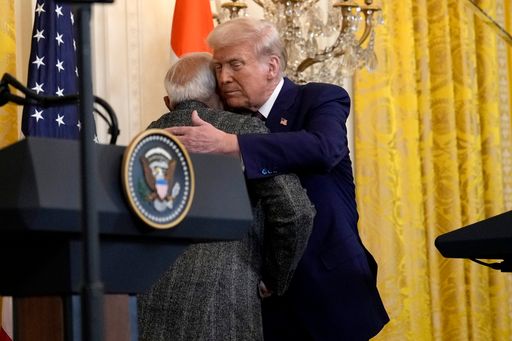Washington DC — In Kremlin, Steve Witkoff and Vladimir Putin smiled for the cameras.
What followed on Wednesday, according to the Kremlin, was a three-hour meeting filled with "constructive" signals on the "Ukrainian question."
"He conveyed some signals," Putin's foreign policy aide Yuri Ushakov told reporters. "And received corresponding ones."
Witkoff, the Trump administration's special envoy, has become the man in the middle of two wars — one in Ukraine, one in Gaza.
After a string of unsuccessful ceasefire talks meant to pause Israel's war in Gaza and a widely questioned aid visit to southern areas of the enclave, Witkoff is now tasked with coaxing Russia into a ceasefire just days before President Donald Trump's deadline for Moscow expires this week.
Trump initially gave Moscow 50 days, then ripped up the clock and moved the deadline forward, warning: end the war or pay the price.
"We're going to see what happens," Trump said on Wednesday. "We'll make that determination at that time."
The US President posted on his Truth Social that Witkoff had a "highly productive" meeting with the Russian President, and "great progress" was made.
Back at the table
The stakes are immense.
"Everyone agrees this war must come to a close, and we will work towards that in the days and weeks to come," Trump added.
Ukrainian President Volodymyr Zelenskyy, for his part, isn't holding his breath.
"For Russia to move toward peace, it must run out of money for the war," Ukraine’s president said ahead of the talks. He welcomed the threat of broader sanctions, including tariffs on countries buying Russian oil, calling them "necessary."
Witkoff's relevance in the Ukraine file comes as Trump grows publicly impatient with Moscow.
"We thought we had (the war) settled numerous times," Trump said last month, "and then President Putin goes out and starts launching rockets into some city like Kyiv [Kiev] and kills a lot of people in a nursing home or whatever."
Since their last meeting in April, Russia has stepped up its assault. The three previous rounds of negotiations in Istanbul provided a rare platform for dialogue, though they ultimately ended without a breakthrough.
Moscow continues to demand the demilitarisation of Ukraine and formal recognition of territories it now holds. Kiev and its Western allies call that a non-starter.
Yet it's Witkoff who's back at the table.
His appointment was seen as unconventional from the start. A billionaire real estate developer with deep ties to Trump, Witkoff had no previous diplomatic track record when he was tapped for the role last year.
His Gaza role was meant to be limited: surgical, a bridge to a ceasefire and a hostage deal.
Breaking ice on Ukraine war
In July, Witkoff joined a round of talks in Doha aimed at ending the Israeli war on Gaza. The US delegation later withdrew, blaming Hamas for not engaging seriously. No agreement was reached.
In Gaza itself, Witkoff's visit to a controversial US-backed, Israeli-run aid distribution point was broadcast widely, but didn't do well in terms of its impact or optics.
Since then, the humanitarian crisis in Gaza has worsened, with starvation growing and the UN warning that a famine looms.
Which raises the question: can the same man who struggled to unlock progress in Gaza now break the ice in Ukraine?
His Russian counterpart, Kirill Dmitriev, greeted him on the tarmac in Moscow. Kremlin footage later showed Witkoff and Putin shaking hands in a palace room with high ceilings.
Beyond the optics, there's ambiguity.
"The meeting was constructive and useful," TASS reported, citing a Kremlin source.
That's not how things look from Kiev.
Overnight from Tuesday to Wednesday, Russia hit a recreational centre in Ukraine's southern Zaporizhzhia region, killing two people and injuring 12, as per regional governor Ivan Fedorov.

Redrawing the battlefield
The challenge for Witkoff is more than negotiating terms. Trump has staked political capital on ending the Ukraine war quickly, even saying he could do it "in one day."
The White House said on Wednesday that the US could slap new sanctions on Russia — and on any nation still buying its oil — depending on how Witkoff's meeting with Putin played out.
As promised, Trump levied a 25 percent additional tariffs on Indian goods over New Delhi's ongoing Russian crude purchases. India has 21 days to sever its energy ties with Moscow or face new punitive tariffs.
Trump has accused India of bankrolling Russia's war in Ukraine by purchasing Russian crude oil at discounted prices, a practice that the Biden administration had permitted.
"I determine that it is necessary and appropriate to impose an additional ad valorem duty on imports of articles of India," Wednesday's order said, "which is directly or indirectly importing Russian Federation oil."
Trump initially cast blame on Zelenskyy for prolonging the war, giving Putin the benefit of the doubt, but his tone has since shifted, with public remarks growing sharply critical of the Russian president.
Trump's latest deadline for Russian to ceasefire runs out in two days.
The White House is now bracing for impact as sweeping secondary sanctions on Russia are expected to take effect on Friday, in what could mark the most aggressive move yet in Trump's push to end the war that could redraw the battlefield far beyond Ukraine.




















